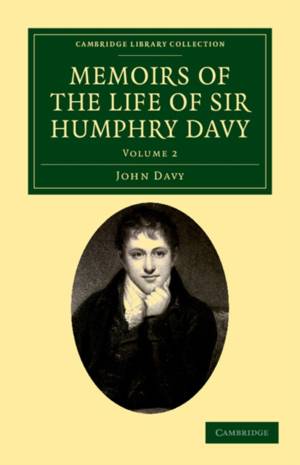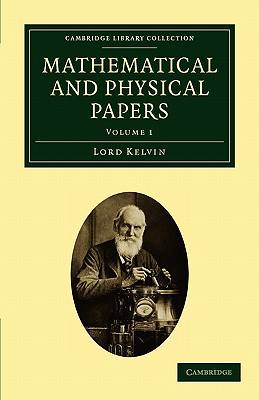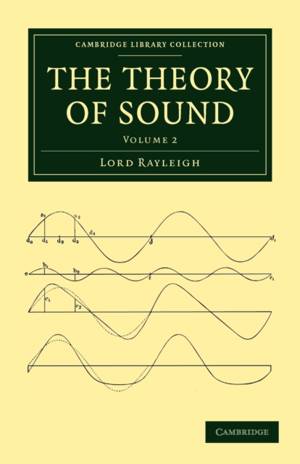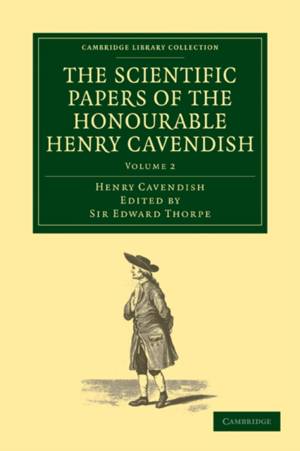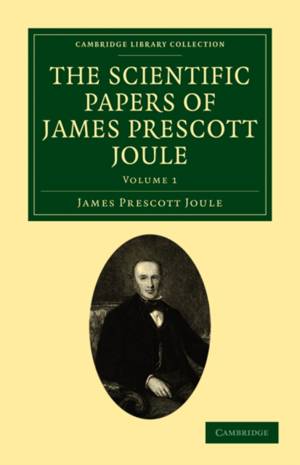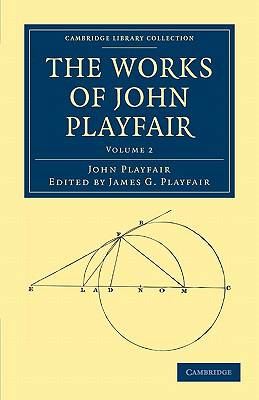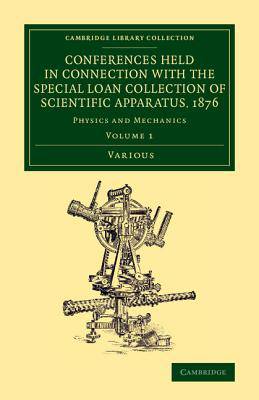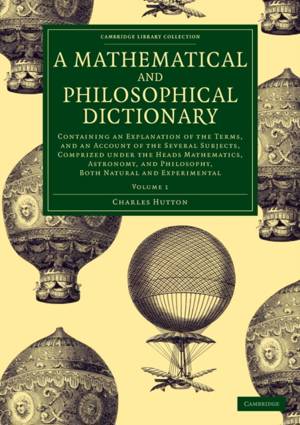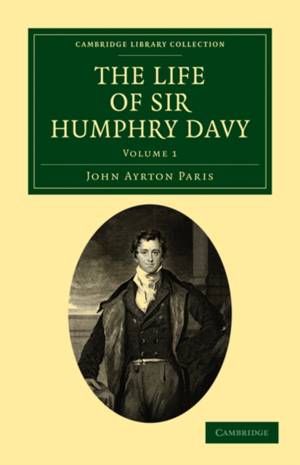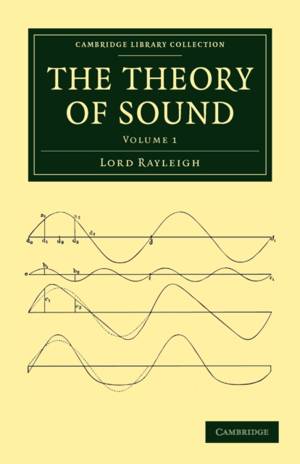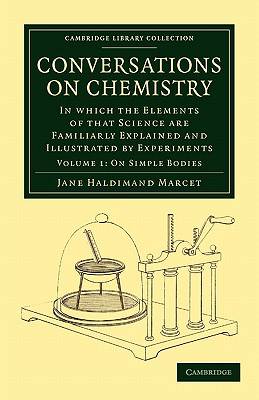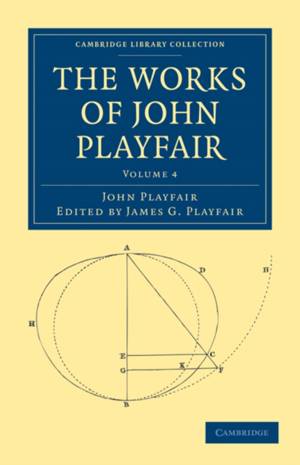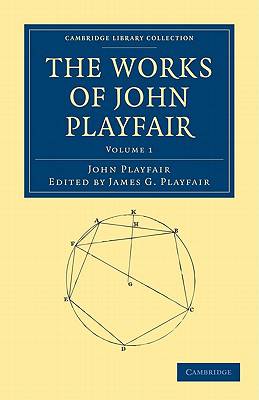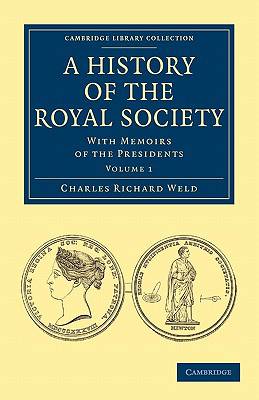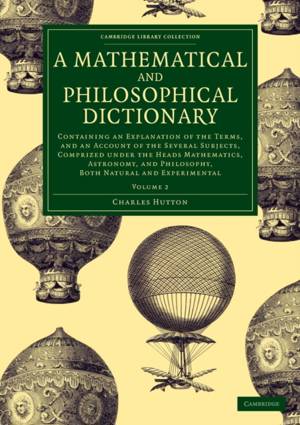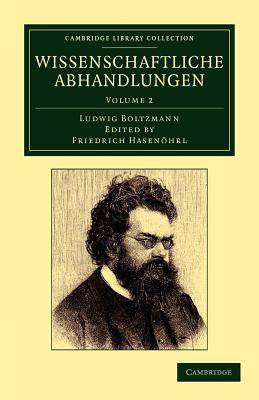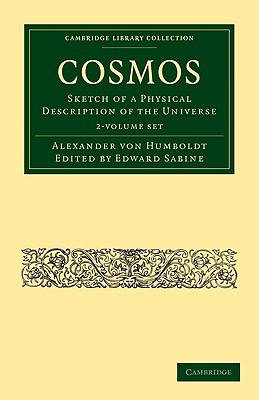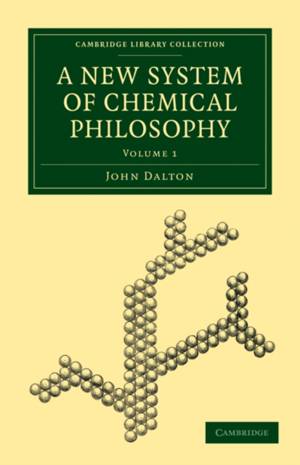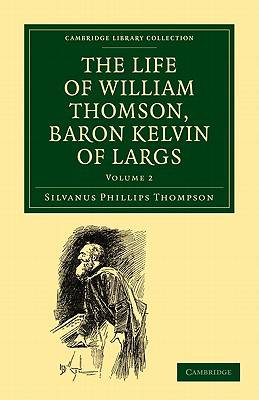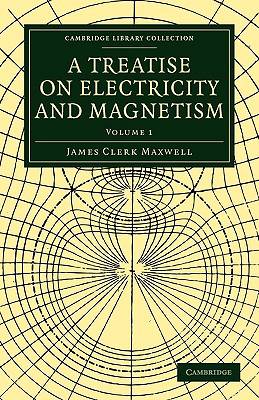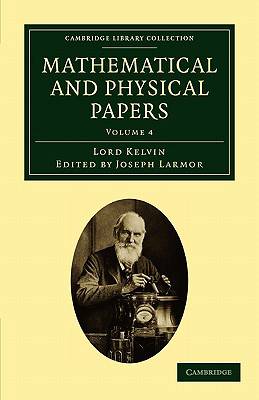
- Retrait gratuit dans votre magasin Club
- 7.000.000 titres dans notre catalogue
- Payer en toute sécurité
- Toujours un magasin près de chez vous
- Retrait gratuit dans votre magasin Club
- 7.000.0000 titres dans notre catalogue
- Payer en toute sécurité
- Toujours un magasin près de chez vous
Résultats pour "Cambridge Library Collection - Physical Sciences"
-
Memoirs of the Life of Sir Humphry Davy
John Davy
- Livre broché | Anglais | Cambridge Library Collection - Physical Sciences
- Sir Humphry Davy (1778-1829) was a hugely influential chemist, inventor, and public lecturer who is recognised as one of the first professional scient... Savoir plus
90,45 €Livraison 2 à 3 semaines90,45 €Livraison 2 à 3 semaines -
Mathematical and Physical Papers - Volume 1
William Baron Thomson, Lord Kelvin
- Livre broché | Anglais | Cambridge Library Collection - Physical Sciences
- William Thomson, first Baron Kelvin (1824-1907), is best known for devising the Kelvin scale of absolute temperature and for his work on the first and... Savoir plus
120,95 €Livraison 2 à 3 semaines120,95 €Livraison 2 à 3 semaines -
The Theory of Sound
John William Strutt, Baron Rayleigh John William Strutt
- Livre broché | Anglais | Cambridge Library Collection - Physical Sciences
- John William Strutt, third Baron Rayleigh (1842-1919) was an English physicist best known as the co-discoverer of the element argon, for which he rece... Savoir plus
70,95 €Livraison 2 à 3 semaines70,95 €Livraison 2 à 3 semaines -
The Scientific Papers of the Honourable Henry Cavendish, F. R. S - Volume 2
Henry Cavendish
- Livre broché | Anglais | Cambridge Library Collection - Physical Sciences
- Henry Cavendish (1731-1810) was an English scientist whose published work was mostly concerned with electricity. He was elected a Fellow of the Royal ... Savoir plus
111,45 €Livraison 2 à 3 semaines111,45 €Livraison 2 à 3 semaines -
The Scientific Papers of James Prescott Joule - Volume 1
James Prescott Joule
- Livre broché | Anglais | Cambridge Library Collection - Physical Sciences
- Sir James Prescott Joule (1818-1889) became one of the most significant physicists of the nineteenth century, although his original interest in scienc... Savoir plus
130,45 €Livraison 2 à 3 semaines130,45 €Livraison 2 à 3 semaines -
The Life and Letters of Faraday - Volume 2
Bence Jones, Michael Faraday, Jones Bence
- Livre broché | Anglais | Cambridge Library Collection - Physical Sciences
- Michael Faraday (1791-1867) made foundational contributions in the fields of physics and chemistry, notably in relation to electricity. One of the gre... Savoir plus
111,45 €Livraison 2 à 3 semaines111,45 €Livraison 2 à 3 semaines -
The Works of John Playfair - Volume 2
John Playfair
- Livre broché | Anglais | Cambridge Library Collection - Physical Sciences
- John Playfair (1748-1819) was a Scottish mathematician and geologist best known for his defence of James Hutton's geological theories. He attended the... Savoir plus
90,45 €Livraison 2 à 3 semaines90,45 €Livraison 2 à 3 semaines -
Conferences Held in Connection with the Special Loan Collection of Scientific Apparatus, 1876 - Volume 1
Various
- Livre broché | Anglais | Cambridge Library Collection - Physical Sciences
- In 1876 the South Kensington Museum held a major international exhibition of scientific instruments and equipment, both historical and contemporary. M... Savoir plus
80,95 €Livraison 2 à 3 semaines80,95 €Livraison 2 à 3 semaines -
A Mathematical and Philosophical Dictionary - Volume 1
Charles Hutton
- Livre broché | Anglais | Cambridge Library Collection - Physical Sciences
- Born into a Newcastle coal mining family, Charles Hutton (1737-1823) displayed mathematical ability from an early age. He rose to become professor of ... Savoir plus
136,95 €Livraison 2 à 3 semaines136,95 €Livraison 2 à 3 semaines -
The Life of Sir Humphry Davy - Volume 1
John Ayrton Paris
- Livre broché | Anglais | Cambridge Library Collection - Physical Sciences
- Sir Humphry Davy (1778-1829) was a hugely influential chemist, inventor, and public lecturer who is recognised as one of the first professional scient... Savoir plus
86,95 €Livraison 2 à 3 semaines86,95 €Livraison 2 à 3 semaines -
The Theory of Sound - Volume 1
John William Strutt, Baron Rayleigh John William Strutt
- Livre broché | Anglais | Cambridge Library Collection - Physical Sciences
- John William Strutt, third Baron Rayleigh (1842-1919) was an English physicist best known as the co-discoverer of the element argon, for which he rece... Savoir plus
70,95 €Livraison 2 à 3 semaines70,95 €Livraison 2 à 3 semaines -
Conversations on Chemistry - Volume 1
Jane Haldiman Marcet
- Livre broché | Anglais | Cambridge Library Collection - Physical Sciences
- Jane Haldimand Marcet (1769-1858) was a pioneer in the field of education who wrote accessible introductory books on science and economics. Noting tha... Savoir plus
90,45 €Livraison 2 à 3 semaines90,45 €Livraison 2 à 3 semaines -
The Works of John Playfair - Volume 4
John Playfair
- Livre broché | Anglais | Cambridge Library Collection - Physical Sciences
- John Playfair (1748-1819) was a Scottish mathematician and geologist best known for his defence of James Hutton's geological theories. He attended the... Savoir plus
106,45 €Livraison 2 à 3 semaines106,45 €Livraison 2 à 3 semaines -
The Works of John Playfair - Volume 1
John Playfair
- Livre broché | Anglais | Cambridge Library Collection - Physical Sciences
- John Playfair (1748-1819) was a Scottish mathematician and geologist best known for his defence of James Hutton's geological theories. He attended the... Savoir plus
111,45 €Livraison 2 à 3 semaines111,45 €Livraison 2 à 3 semaines -
A History of the Royal Society - Volume 1
Charles Richard Weld
- Livre broché | Anglais | Cambridge Library Collection - Physical Sciences
- The Royal Society has been dedicated to scientific inquiry since the seventeenth century and has seen a long line of illustrious scientists and thinke... Savoir plus
111,45 €Livraison 2 à 3 semaines111,45 €Livraison 2 à 3 semaines -
A Mathematical and Philosophical Dictionary - Volume 2
Charles Hutton
- Livre broché | Anglais | Cambridge Library Collection - Physical Sciences
- Born into a Newcastle coal mining family, Charles Hutton (1737-1823) displayed mathematical ability from an early age. He rose to become professor of ... Savoir plus
156,45 €Livraison 2 à 3 semaines156,45 €Livraison 2 à 3 semaines -
Wissenschaftliche Abhandlungen
Ludwig Boltzmann
- Livre broché | Allemand | Cambridge Library Collection - Physical Sciences
- The Austrian physicist Ludwig Eduard Boltzmann (1844-1906), educated at the University of Vienna, was appointed professor of mathematical physics at t... Savoir plus
120,95 €Livraison 2 à 3 semaines120,95 €Livraison 2 à 3 semaines -
Popular Lectures and Addresses
William Baron Thomson, Lord Kelvin William Thomson
- Livre broché | Anglais | Cambridge Library Collection - Physical Sciences
- William Thomson, Baron Kelvin (1824-1907), was educated at Glasgow and Cambridge. While only in his twenties, he was awarded the University of Glasgow... Savoir plus
114,45 €Livraison 2 à 3 semaines114,45 €Livraison 2 à 3 semaines -
Cosmos 2 Volume Paperback Set
Alexander von Humboldt
- Von Humboldt's two-volume study represents a significant and important contribution to the general understanding of the physical world in the nineteen... Savoir plus
120,95 €Livraison 1 à 2 semaines120,95 €Livraison 1 à 2 semaines -
A New System of Chemical Philosophy
John Dalton
- Livre broché | Anglais | Cambridge Library Collection - Physical Sciences
- The chemist and meteorologist John Dalton (1766-1844) published A New System of Chemical Philosophy in two volumes, between 1808 and 1827. Dalton's di... Savoir plus
120,95 €Livraison 2 à 3 semaines120,95 €Livraison 2 à 3 semaines -
The Life and Letters of Faraday - Volume 1
Bence Jones
- Livre broché | Anglais | Cambridge Library Collection - Physical Sciences
- Michael Faraday (1791-1867) made foundational contributions in the fields of physics and chemistry, notably in relation to electricity. One of the gre... Savoir plus
90,45 €Livraison 2 à 3 semaines90,45 €Livraison 2 à 3 semaines -
The Life of William Thomson, Baron Kelvin of Largs - Volume 2
Silvanus Phillips Thompson
- Livre broché | Anglais | Cambridge Library Collection - Physical Sciences
- The mathematician and physicist William Thomson, 1st Baron Kelvin, (1824-1907) was one of Britain's most influential scientists, famous for his work o... Savoir plus
125,95 €Livraison 2 à 3 semaines125,95 €Livraison 2 à 3 semaines -
A Treatise on Electricity and Magnetism - Volume 1
James Clerk Maxwell, Maxwell James Clerk
- Livre broché | Anglais | Cambridge Library Collection - Physical Sciences
- Arguably the most influential nineteenth-century scientist for twentieth-century physics, James Clerk Maxwell (1831-1879) demonstrated that electricit... Savoir plus
101,45 €Livraison 2 à 3 semaines101,45 €Livraison 2 à 3 semaines -
Mathematical and Physical Papers - Volume 4
William Baron Thomson, Lord Kelvin
- Livre broché | Anglais | Cambridge Library Collection - Physical Sciences
- William Thomson, first Baron Kelvin (1824-1907), is best known for devising the Kelvin scale of absolute temperature and for his work on the first and... Savoir plus
120,95 €Livraison 2 à 3 semaines120,95 €Livraison 2 à 3 semaines





